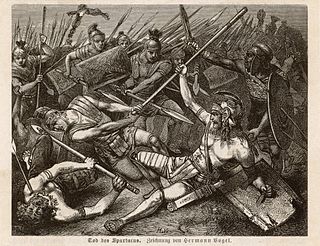Related Research Articles

The 1st century BC, also known as the last century BC and the last century BCE, started on the first day of 100 BC and ended on the last day of 1 BC. The AD/BC notation does not use a year zero; however, astronomical year numbering does use a zero, as well as a minus sign, so "2 BC" is equal to "year –1". 1st century AD follows.

Year 73 BC was a year of the pre-Julian Roman calendar. At the time it was known as the Year of the Consulship of Lucullus and Longinus. The denomination 73 BC for this year has been used since the early medieval period, when the Anno Domini calendar era became the prevalent method in Europe for naming years.
Year 105 BC was a year of the pre-Julian Roman calendar. At the time it was known as the Year of the Consulship of Rufus and Maximus and the Sixth Year of Yuanfeng. The denomination 105 BC for this year has been used since the early medieval period, when the Anno Domini calendar era became the prevalent method in Europe for naming years.
This article concerns the period 69 BC – 60 BC.
This article concerns the period 79 BC – 70 BC.

This article concerns the period 109 BC – 100 BC.
This article concerns the period 119 BC – 110 BC.
This article concerns the period 149 BC – 140 BC.
Year 91 BC was a year of the pre-Julian Roman calendar. At the time it was known as the Year of the Consulship of Philippus and Caesar and the Second Year of Zhenghe. The denomination 91 BC for this year has been used since the early medieval period, when the Anno Domini calendar era became the prevalent method in Europe for naming years.

Year 89 BC was a year of the pre-Julian Roman calendar. At the time it was known as the Year of the Consulship of Strabo and Cato and the Fourth Year of Zhenghe. The denomination 89 BC for this year has been used since the early medieval period, when the Anno Domini calendar era became the prevalent method in Europe for naming years.

Year 72 BC was a year of the pre-Julian Roman calendar. At the time it was known as the Year of the Consulship of Publicola and Lentulus. The denomination 72 BC for this year has been used since the early medieval period, when the Anno Domini calendar era became the prevalent method in Europe for naming years
Year 111 BC was a year of the pre-Julian Roman calendar. At the time it was known as the Year of the Consulship of Serapio and Bestia and the Sixth Year of Yuanding. The denomination 111 BC for this year has been used since the early medieval period, when the Anno Domini calendar era became the prevalent method in Europe for naming years.
Year 143 BC was a year of the pre-Julian Roman calendar. At the time it was known as the Year of the Consulship of Pulcher and Macedonicus. The denomination 143 BC for this year has been used since the early medieval period, when the Anno Domini calendar era became the prevalent method in Europe for naming years.
Year 196 BC was a year of the pre-Julian Roman calendar. At the time it was known as the Year of the Consulship of Purpureo and Marcellus. The denomination 196 BC for this year has been used since the early medieval period, when the Anno Domini calendar era became the prevalent method in Europe for naming years.

The Third Servile War, also called the Gladiator War and the War of Spartacus by Plutarch, was the last in a series of slave rebellions against the Roman Republic known as the Servile Wars. This third rebellion was the only one that directly threatened the Roman heartland of Italy. It was particularly alarming to Rome because its military seemed powerless to suppress it.

Spartacus was a Thracian gladiator who, along with Crixus, Gannicus, Castus, and Oenomaus, was one of the escaped slave leaders in the Third Servile War, a major slave uprising against the Roman Republic. Little is known about him beyond the events of the war, and surviving historical accounts are sometimes contradictory. All sources agree that he was a former gladiator and an accomplished military leader.

Spartacus: War of the Damned is the third and final season of the American television series Spartacus, a Starz television series, which follows Spartacus: Vengeance. The series was inspired by the historical figure of Spartacus, a Thracian gladiator who, from 73 to 71 BC, led a major slave uprising against the Roman Republic. It premiered on January 25, 2013, and concluded on April 12, 2013.

Sins of Rome is a 1953 historical drama film directed by Riccardo Freda and loosely based on the life story of Spartacus. The rights of film's negatives and copies were bought by the producers of Stanley Kubrick's 1960 film Spartacus, as to prevent eventual new releases of the film that could have damaged the commercial outcome of Kubrick’s film; this resulted in Sins of Rome's withdrawal from market for about thirty years.

The Battle of Picenum was one of the major battles of the Third Servile War, between the slave army of Spartacus and the combined consular forces of the Roman Republic led by the two consuls Lucius Gellius and Gnaeus Cornelius Lentulus Clodianus. It took place in Picenum region in 72 BC. It was a victory for Spartacus, and it proved to be his greatest triumph of the war.
References
- ↑ Pompey, Command (p. 20). Nic Fields, 2012. ISBN 978-184908-572-4